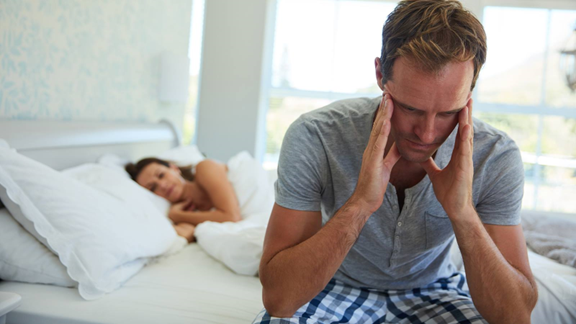Published on: February 21, 2023

Depression can be tough to deal with, especially when it’s so hard to pin down what exactly is causing your depressive symptoms.
Depression and erectile dysfunction (ED) are common health issues that can affect men differently. Studies have shown that as many as one in three men will have to deal with ED at some point in their lives—and it’s not just a guy thing, either.
The link between these two conditions has been studied for decades, but researchers still don’t know exactly why it happens. Some experts believe that depression causes ED by altering levels of certain neurotransmitters in the brain. In contrast, others think it could be caused by chronic stress or anxiety, leading to decreased blood flow to the penis.
While there isn’t enough evidence yet to determine what causes depression or ED, there are some things you can do today if you’re experiencing either condition or both!
Depression and ED are both serious mental health issues, but they can sometimes overlap.
If you’ve ever felt depressed, you know it can be hard to get out of bed in the morning. You might feel like your mind is fuzzy or foggy or like nothing is going right for you. But when depression starts to affect your physical health, that’s when things get scary—and potentially dangerous.
Depression and ED have a complicated relationship: some research suggests that depression can lead to ED; other data suggest that ED can make people more vulnerable to depression. Either way, it’s important to know how these two conditions are related so you can take steps toward healing either one of them if necessary.
ED stands for erectile dysfunction, and it’s a condition that affects men after they reach puberty. ED can be caused by physical factors like diabetes or obesity, but it often has psychological causes as well. These include stress, anxiety, depression, or relationship issues. Men with ED may also have trouble getting or keeping an erection because of low self-esteem or body image issues.
Depression is a mood disorder characterized by feelings of sadness and hopelessness that can last for weeks or even months at a time. Depression can also cause changes in your daily activities: You might start skipping work or school; avoiding social interactions; sleeping too much; eating too little; losing interest in things you used to enjoy; having trouble concentrating; feeling insecure about yourself; thinking about suicide (even though you don’t want to die).
Depression and ED are both common and can be related to one another. For example, people with depression may eat more because they feel less in control of their lives; this can lead to weight gain, making it harder for them to feel confident about themselves. A person may also have trouble feeling attractive, making it hard to enjoy sex or have an orgasm.
Some people with ED have low self-esteem because of their body image and lack of sexual satisfaction. Other people with ED may worry so much about what others think that they don’t want anyone else to know they have a problem, making it hard to seek treatment or even talk about what’s happening.
In a recent study published in the Journal of Sexual Medicine, researchers found that men suffering from depression were more likely to experience erectile dysfunction (ED) than men who did not have depression. They also found that men with ED were more likely to report having feelings of sadness and hopelessness.
The researchers found that both conditions shared several risk factors, including smoking, obesity, diabetes, and heart disease. However, in addition to these risk factors, they also noted that some medications used to treat depression could cause ED. These medications include selective serotonin reuptake inhibitors (SSRIs), tricyclic antidepressants (TCAs), and monoamine oxidase inhibitors (MAOIs).
The researchers concluded that there is a link between depression and erectile dysfunction and recommend that doctors treating one condition should also consider treating the other condition as well.
Erectile dysfunction is a common condition that affects many men. Treatment options vary depending on the severity of the condition, but may include medications, lifestyle modifications, or even surgery. Medications such as Viagra and Cialis are commonly prescribed to help improve blood flow to the penis. Lifestyle changes like avoiding smoking and excessive alcohol consumption can also help improve erectile function. In more severe cases, surgery may be required to restore normal blood flow to the penis. Other treatments such as vacuum devices and penile implants are also available for those who do not respond to other therapies. Regardless of the treatment option chosen, it is important for men to speak with their doctor about their symptoms so that appropriate treatment can be started in a timely manner.
For more information about Mental Health Conditions. Visit our Mental Health Library page. To understand and cope with your Depression and erectile dysfunction symptoms, get help from our Top 10 Psychiatrists, Psychologists, and Therapists who are known for providing the best mental health treatment and psychiatry services. To book an appointment please call us at (800) 457-4573 or submit an appointment request.
Tags,
Discover the essence of Harmony United Psychiatric Care through our impactful numbers. Our experienced team is dedicated to fostering mental well-being.
10
+
Years of Experience
With 10 years of unwavering commitment to mental health, we bring a wealth of experience to support our patients on their journey.
About Us71
+
Providers
Our dedicated team comprises 64 skilled therapists', psychiatrists', psychologists', ensuring personalized and expert care for each individual.
Providers20
+
Locations
Across multiple locations, we extend our reach to provide accessible mental health care tailored to diverse communities.
Locations114581
+
Patients Served
Over 114581 patients have entrusted us with their mental well-being, experiencing compassionate care and positive outcomes.
Book AppointmentWelcome to the latest edition of “Discover Harmony,” the newsletter from Harmony United Psychiatric Care! In this edition, we bring you insights, updates, and valuable information to support your mental well-being journey.
Subscribe to newsletter